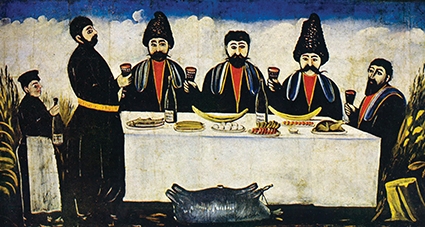‘There Will Be Khinkali and Drinking!’ Ogden on Hospitality
OPED
Any foreigner in Georgia, whether he be the seasoned expat or a new arrival fresh off the plane, will know (or at least have heard) about the great Georgian pride in their national hospitality. I should point out that there are many forms of Georgian hospitality, but for young foreign chaps like me, the initial encounter comes in the form of a Georgian man performing the celebrated let-me-be-your-brother role: ‘There will be khinkali and drinking,’ he says, with the air of the Creator establishing land and sea. These parties, whether impromptu supras in a modest home or in a grand restaurant booked and paid for, usually seem to be what is referred to when one hears the phrase ‘Georgian hospitality’. They typically result in one drinking enough wine to sink a ship and listening to inflated complimentary toasts that leave you feeling sure that you are in possession of the best qualities of Mother Teresa, Abraham Lincoln and Mike Tyson.
However, the notion of Georgian hospitality incurs a great deal of cynicism from foreigners. For sour English sceptics like myself, the sight and sound of Georgians toasting you, dubbing you a ‘good man’, wishing you every success in life and heaping blessings on your ancestors on first acquaintance can come across as ludicrously insincere. Besides which, a significant number of my own forebears were lawyers, politicians or career criminals (or a mixture of all three), so whether they deserve a blessing at all is highly debatable.
This, of course, is the view of one Englishman, and we are notoriously cold; we tolerate rather than like our friends, endure our families for legal reasons (murder and assault being frowned upon these days) and marry due to a genetic instinct that the English race must survive, if only to point out to the rest of the species just how damn silly they all are, and if they would just drink tea and vent their anger towards each other with curt remarks or a timely sniff then there would be no more war.
For us, manners are one thing, but heaping praise and good wishes on perfect strangers is nothing short of madness.
Georgians are hospitable...though with certain Georgians, this only lasts as long as one agrees with absolutely everything they say. It can be unnerving to hear a crowd of ten Georgian men growling about how Stalin was a great man, how homosexuality is a ‘sickness’ and how women are either prostitutes or mothers, then look them in the eye and say ‘No’. (I’ve lost count of the amount of houses I’ve left in disgrace, though thankfully that type of ‘conservative’ Georgian seems to be a dying breed.)
Some years ago, an American friend of mine got into a fight, and seeing his face bruised I asked what had happened. It turned out he’d been at a supra.
‘I just didn’t want to do a traditional toast with [a guy]. He pushed me, so I hit him.’
Naturally, most Georgians cringe at such stories, and such ugly incidents are rare. These ‘traditional’ Georgians are just over-bearing and slightly pushy, aggressively friendly in a way which can be annoying rather than offensive; in the same way, foreigners can be entirely tactless and unspeakably arrogant: I’ve seen both sides kick the tension off.
Don’t get the wrong idea; after all, as an Englishman with a smattering of Welsh blood, I don’t particularly like anybody. When one finds a real Georgian friend (and not the type who puts his paw on your shoulder, promises to show you where his grandfather makes wine, then asks if you like football and strip clubs), you’ll never find a truer companion. Just endure the endless toasts, the half-hearted offers and forceful friendships that borderline on violations of personal space until you find one of the many normal Georgians who are as sick of their hospitality as you are.
Tim Ogden












